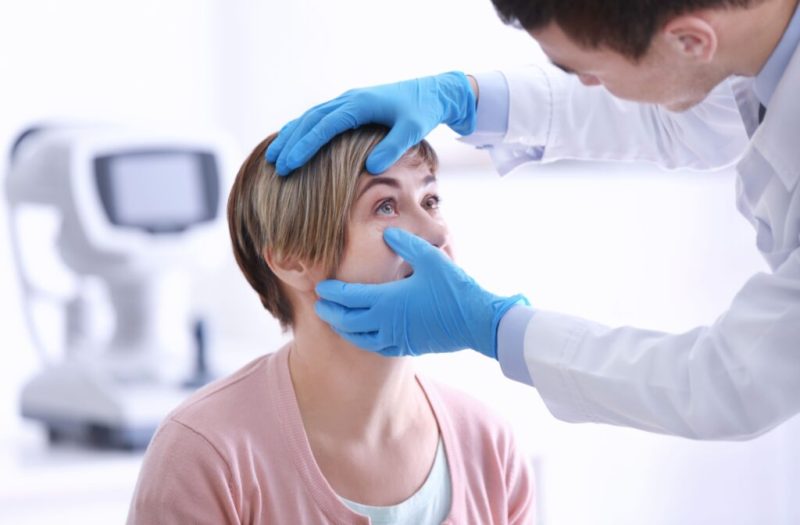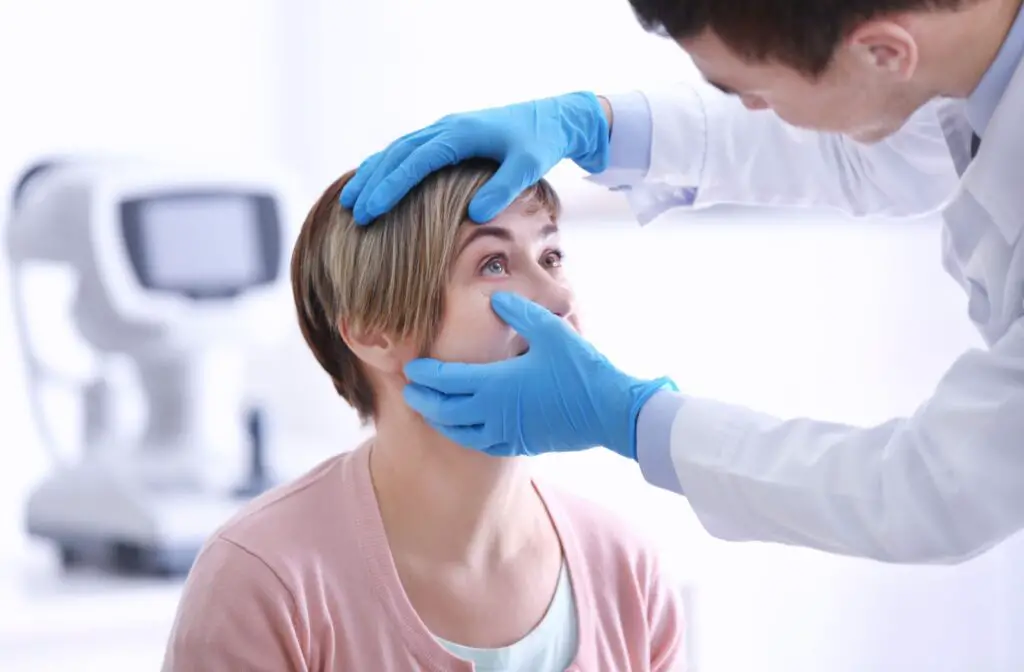High blood pressure, also known as hypertension, is a condition that affects millions of people worldwide. While it’s commonly associated with heart disease and stroke, many are unaware that it can also affect vision. Some individuals with hypertension report seeing flashing lights, floaters, or spots in their vision — symptoms that can signal serious eye complications. Understanding the link between high blood pressure and these visual disturbances is crucial for early detection and prevention of permanent vision damage.
This article explores how high blood pressure impacts eye health, why flashing lights may occur, and what steps you can take to protect your eyesight. We’ll also discuss related eye conditions, treatment options, and preventive measures to maintain optimal vision health.
Understanding High Blood Pressure and Its Impact on the Body

High blood pressure occurs when the force of blood against the walls of your arteries remains consistently too high. Over time, this excess pressure damages blood vessels, making them weaker and less flexible. It also increases the workload on the heart, kidneys, and brain. If left uncontrolled, hypertension can lead to heart attacks, strokes, kidney failure, and even vision loss.
The condition is often called the “silent killer” because it rarely produces noticeable symptoms in its early stages. Most people discover it only after complications arise. The eyes, which are rich in tiny, delicate blood vessels, are particularly vulnerable to the effects of hypertension. When these vessels are damaged, it can lead to a range of vision problems, including flashing lights, blurred vision, or even sudden blindness.
Understanding how high blood pressure affects blood flow to the eyes is the first step toward recognizing and preventing serious complications.
The Connection Between High Blood Pressure and Eye Health
The eyes contain an intricate network of small arteries and veins that supply oxygen and nutrients to the retina — the light-sensitive tissue responsible for vision. When blood pressure is too high, it can damage or narrow these vessels, reducing blood flow to the retina. This condition, known as hypertensive retinopathy, can lead to visual disturbances like flashing lights, floaters, or dark spots.
In more severe cases, high blood pressure can also cause fluid to leak into the retina or optic nerve, resulting in swelling and distorted vision. These symptoms can appear suddenly or gradually, depending on how high and how long blood pressure has been elevated. Persistent or recurrent episodes of flashing lights should never be ignored, as they may signal retinal detachment or optic nerve damage — both of which can lead to permanent vision loss.
In short, hypertension is not just a cardiovascular problem; it is also an ocular emergency when it affects the delicate structures within the eyes.
Why Do You See Flashing Lights in Your Eyes?
Flashing lights, medically known as photopsia, occur when the retina is stimulated or irritated in some way. These flashes can appear as brief bursts of light, lightning streaks, or flickering arcs in the field of vision. There are several potential causes, but in people with high blood pressure, they often arise due to vascular or retinal changes.
When blood vessels in the retina become damaged or leak due to hypertension, they can cause small areas of bleeding or swelling that irritate the retina. This irritation triggers nerve impulses that the brain interprets as flashes of light. Additionally, fluctuations in blood pressure can alter blood flow in the optic nerve, causing similar symptoms.
While not all flashing lights are caused by hypertension, their presence in someone with high blood pressure should always be taken seriously. It may indicate an underlying issue such as hypertensive retinopathy, retinal vein occlusion, or even the early stages of retinal detachment.
Hypertensive Retinopathy: The Hidden Eye Disease
Hypertensive retinopathy is a condition that develops when chronic high blood pressure damages the tiny blood vessels in the retina. Over time, the vessel walls may thicken, narrow, or leak, leading to swelling and bleeding. The severity of retinopathy is directly related to how high and how long blood pressure remains uncontrolled.
In the early stages, hypertensive retinopathy may cause no noticeable symptoms. However, as the condition progresses, you may begin to see visual disturbances such as flashing lights, blurred vision, or dark spots. In advanced stages, the retina may become severely damaged, and permanent vision loss can occur.
Eye doctors can detect hypertensive retinopathy through a comprehensive eye examination using an ophthalmoscope. This allows them to see changes in the retinal blood vessels, such as narrowing, hemorrhages, or fluid accumulation. Regular eye checkups are therefore essential for anyone diagnosed with high blood pressure, as they can help detect problems early before irreversible damage occurs.
Other Eye Conditions Linked to High Blood Pressure
Retinal Vein Occlusion
High blood pressure is a major risk factor for retinal vein occlusion (RVO), a condition where one of the veins carrying blood away from the retina becomes blocked. This blockage causes blood and fluid to build up, leading to swelling and damage in the retina. One of the early symptoms of RVO can be flashing lights, followed by blurred or distorted vision.
RVO can develop suddenly and often affects one eye at a time. In severe cases, it can result in significant vision loss. Immediate medical attention is required to prevent complications and preserve as much vision as possible.
Retinal Artery Occlusion
Similar to a stroke in the eye, retinal artery occlusion (RAO) occurs when a blood clot or plaque blocks one of the arteries supplying the retina. It is a medical emergency that can cause sudden, painless vision loss. People with uncontrolled high blood pressure are at higher risk for this condition.
In some cases, patients may experience flashing lights or shadows before complete vision loss occurs. RAO is a warning sign of serious vascular problems and should prompt a thorough cardiovascular evaluation in addition to eye treatment.
Optic Neuropathy
Hypertensive optic neuropathy happens when high blood pressure damages the optic nerve — the pathway that transmits visual information from the eye to the brain. This damage can reduce vision clarity, cause blind spots, and sometimes produce flashing lights.
When blood flow to the optic nerve is restricted, nerve cells begin to die, leading to a gradual or sudden loss of vision. Early detection and control of blood pressure are critical to preventing irreversible nerve damage.
Are Flashing Lights Always Caused by High Blood Pressure?
Not necessarily. Flashing lights can result from several different eye or neurological conditions, not just hypertension. Some of the most common alternative causes include:
-
Posterior vitreous detachment (PVD) — occurs when the gel-like substance inside the eye separates from the retina.
-
Retinal tears or detachment — can cause sudden flashes of light, usually accompanied by a sudden increase in floaters or loss of side vision.
-
Migraine with aura — often includes visual disturbances such as flashing lights or zigzag patterns before the onset of a headache.
-
Diabetic retinopathy — caused by damage to retinal blood vessels due to high blood sugar levels.
However, if you have high blood pressure and experience flashing lights, it’s important not to assume they are harmless. A comprehensive eye examination is necessary to determine the exact cause and rule out any serious complications.
When to See a Doctor
Flashing lights in your eyes should never be ignored, especially if they appear suddenly or are accompanied by other symptoms like vision loss, dark spots, or eye pain. These could be signs of a retinal tear or detachment, which require immediate treatment to prevent permanent blindness.
If you have high blood pressure, you should also schedule regular eye exams to monitor for hypertensive retinopathy and related conditions. Early detection is the key to protecting your eyesight. Contact your doctor immediately if you experience:
-
Persistent or sudden flashing lights
-
A shadow or curtain over part of your vision
-
Sudden loss of central or peripheral vision
-
Severe headaches or dizziness along with vision changes
These symptoms can indicate serious complications that need urgent care.
How to Diagnose Eye Problems Related to High Blood Pressure
Eye doctors use several tests to diagnose hypertension-related eye conditions. A dilated eye exam allows them to inspect the retina and optic nerve for signs of damage. They may also perform imaging tests like optical coherence tomography (OCT) or fluorescein angiography to visualize blood flow and detect any blockages or leaks.
Blood pressure readings are also essential for diagnosis. If your eye doctor suspects hypertensive retinopathy, they may refer you to a physician or cardiologist for further evaluation. Managing your overall cardiovascular health is as important as treating the eye symptoms themselves.
These diagnostic steps not only identify the cause of flashing lights but also reveal the extent of retinal damage, guiding proper treatment and follow-up care.
Treatment Options for Flashing Lights Caused by High Blood Pressure
The primary goal in treating vision problems linked to hypertension is to control blood pressure. Without addressing the underlying cause, eye symptoms will likely persist or worsen. Doctors usually recommend a combination of lifestyle changes and medication to keep blood pressure within a healthy range.
If hypertensive retinopathy or retinal vein occlusion is present, additional treatments may be required. These can include laser therapy to seal leaking vessels, anti-VEGF injections to reduce swelling, or corticosteroid injections to decrease inflammation. The choice of treatment depends on the severity and underlying cause of the visual disturbance.
With early intervention, many patients experience improvement in vision and prevention of further damage. However, once significant retinal or optic nerve damage occurs, it may not be reversible, underscoring the importance of early management.
Lifestyle Changes to Control Blood Pressure and Protect Eye Health
Maintaining healthy blood pressure is one of the best ways to prevent eye problems and other serious health complications. Here are some effective lifestyle adjustments that can help:
Healthy Diet
Adopt a heart-healthy diet rich in fruits, vegetables, whole grains, and lean proteins. Reduce sodium intake and avoid processed foods. The DASH (Dietary Approaches to Stop Hypertension) diet is particularly effective in lowering blood pressure.
Regular Exercise
Engage in at least 30 minutes of moderate exercise most days of the week. Activities like walking, swimming, or cycling improve blood circulation, strengthen the heart, and lower blood pressure naturally.
Stress Management
Chronic stress can elevate blood pressure. Practice relaxation techniques such as deep breathing, meditation, or yoga to reduce tension and maintain emotional balance.
Avoid Smoking and Limit Alcohol
Smoking damages blood vessels and reduces oxygen supply to the eyes. Likewise, excessive alcohol intake can increase blood pressure. Quitting smoking and drinking in moderation significantly improve cardiovascular and ocular health.
Regular Checkups
Visit your doctor regularly for blood pressure monitoring and eye exams. Consistent care helps detect potential issues early before they lead to permanent damage.
Can Flashing Lights Go Away After Blood Pressure Is Controlled?
In many cases, flashing lights caused by high blood pressure can improve once blood pressure is well managed. However, the outcome largely depends on the severity of the damage. If retinal or optic nerve injury has already occurred, some vision problems may persist even after blood pressure is stabilized.
Regular monitoring, medication compliance, and lifestyle changes can greatly improve the prognosis. Patients who actively manage their hypertension often experience fewer visual disturbances and maintain better eye health over time.
If flashes continue even after blood pressure is under control, further evaluation may be necessary to rule out other eye conditions such as retinal tears or detachment.
Long-Term Outlook and Prevention
The long-term outlook for individuals with high blood pressure and vision problems depends on early diagnosis and consistent management. Hypertensive retinopathy can often be stabilized, but severe cases may lead to irreversible vision loss. Therefore, preventing damage through blood pressure control is crucial.
Prevention starts with awareness. Understanding that hypertension affects not just your heart but also your eyes can motivate you to take your treatment seriously. Combining a balanced lifestyle, medication adherence, and regular checkups ensures both cardiovascular and ocular protection.
Keeping your blood pressure within the recommended range doesn’t just preserve your eyesight — it also enhances your overall quality of life and longevity.
Final Thoughts
Flashing lights in your eyes may seem harmless at first, but they can be an important warning sign of underlying health issues, including high blood pressure. Hypertension can silently damage the delicate blood vessels in the retina, leading to hypertensive retinopathy and other serious eye diseases. Ignoring these symptoms can result in irreversible vision loss.
The good news is that with timely diagnosis, effective treatment, and consistent blood pressure control, you can protect your eyesight and overall health. Regular eye exams and medical checkups are your best defense against the silent but damaging effects of hypertension.
If you ever notice flashing lights, don’t wait — get your blood pressure checked and consult an eye specialist immediately. Your vision may depend on it.
FAQs About High Blood Pressure and Flashing Lights in Eyes
Can high blood pressure really cause flashing lights in your eyes?
Yes. High blood pressure can damage the small blood vessels in the retina, leading to a condition called hypertensive retinopathy. This damage may cause visual disturbances such as flashing lights, blurred vision, or even temporary vision loss. These flashes occur because the retina becomes irritated or swollen due to restricted or leaking blood flow.
Are flashing lights in the eyes dangerous?
Flashing lights can be a sign of a serious eye condition, especially if they appear suddenly or are accompanied by floaters or shadows. They may indicate retinal detachment, optic nerve damage, or severe hypertensive changes. If you experience these symptoms, seek medical attention immediately to prevent permanent vision loss.
Can flashing lights go away once blood pressure is under control?
In many cases, yes. When blood pressure is properly managed, blood flow to the retina improves, and the visual disturbances may lessen or disappear. However, if permanent damage to the retina or optic nerve has occurred, some symptoms may persist. Continuous monitoring and regular eye exams are essential for recovery and prevention.
What should I do if I see flashing lights and have high blood pressure?
You should contact an eye doctor or healthcare provider right away. They can perform a comprehensive eye exam to check for retinal tears, bleeding, or swelling caused by hypertension. Early treatment and blood pressure management can prevent further damage and protect your vision.
How can I prevent eye problems caused by high blood pressure?
Maintain a healthy lifestyle that includes a balanced diet, regular exercise, limited salt intake, and stress management. Avoid smoking and excessive alcohol consumption. Most importantly, monitor your blood pressure regularly and attend annual eye exams. Detecting changes early ensures you can take action before serious complications develop.
Can stress-related high blood pressure cause flashing lights too?
Yes. Short-term spikes in blood pressure due to stress can temporarily reduce blood flow to the retina, causing brief flashes of light or blurry vision. Although this may be temporary, frequent episodes should be discussed with a doctor to rule out chronic hypertension or retinal issues.
Disclaimer: This article is for informational purposes only and is not a substitute for professional medical advice. Always consult a qualified healthcare provider regarding any questions or concerns about your health or vision.



